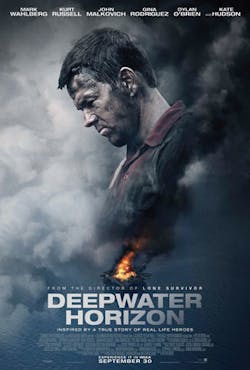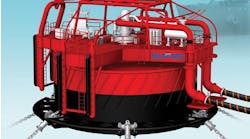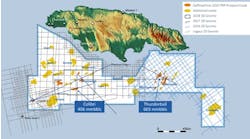The events of April 20, 2010, have been brought to the big screen in “Deepwater Horizon,” a film that depicts the series of decisions that preceded the Macondo well blowout, and subsequent fire and explosion that killed 11 offshore workers and injured several others.
“Deepwater Horizon” revisits the tragic accident, reconstituting it as both a rousing action movie and a somber memorial to the dead. Directed by Peter Berg and starring Mark Wahlberg, this harrowing, gripping film is a homage to the strength and get-on-with-it competence of the rig’s crew, a stirring portrait of brawn, courage, and know-how that somehow rises to another level amidst mayhem and tragedy.
The movie draws heavily from a 2010 New York Times article which documented the incident in intimate detail. While the movie’s portrayal of the people and events is not flawless, there is much here to admire. The film allows audiences to see - probably for the first time - the massive scale and scope of offshore drilling operations; the complexity of the technology and business relationships; and the inherent danger in producing hydrocarbons in thousands of feet of water, from thousands more feet under the seabed.
The film opens with scenes that many readers will have experienced first-hand. We see the main character, played by Mark Wahlberg, driving through bayous and marshes of southern Louisiana to reach Port Fourchon, the logistical hub for many offshore-related businesses. He arrives at the Bristow helicopter base, where he and other members of the crew travel to the rig.
As readers know, those offshore workers and management personnel arrived at the rig hoping to expedite a project that had fallen more than a month behind schedule, at a cost of millions of dollars. That sense of urgency, along with the sense of foreboding, pervades the film too.
The filmmakers get high marks for capturing the texture of rig life - the immense scale of the operation, the huge pipes and machinery involved, the powerful geological forces at work, and the specialized terminology of the crew.
We see the seemingly endless drilling riser descend from the rig to the ocean floor, followed by an impressive visual of an ROV inspecting the riser, reporting back to the rig on its findings. We see the massive blowout preventer on the seafloor, with attendant ominous bubbling and rumbling sounds. And we see the all-important “negative test” on the well integrity that evening.
For most viewers, this will likely be the first glimpse of the extraordinary drilling operations that are at the foundation of our fossil-fuel-based energy industry. And until April 20, 2010, few people outside the industry gave much thought to deepwater drilling. On that count, “Deepwater Horizon” provides a valuable service to a general public that is likely unfamiliar with the basics (and the inherent dangers) of offshore E&P.
But does the movie accurately portray the causes of the accident? “If you asked 50 experts why the deepwater oil rig blew up,” Berg wrote after the movie’s release, “you will get 50 different answers.”
It would be difficult at best for a movie that runs less than two hours to correctly portray an event that has been investigated for years - and even now, experts disagree on the causes. That said, the movie “gets the facts right, and admirably so - but only up to a point,” notes Joel Achenbach, a Washington Post staff writer and National Geographic contributor.
The film depicts operating company managers as acting quickly and imperatively, making life and death decisions in a matter of minutes, and disregarding any dissent. But, while their decisions may have been ill-fated, they gave them more thought than the movie suggests.
The post-Macondo investigations tell a more complicated story than that put forth in “Deepwater Horizon.” There are conflicting accounts as to which parties advanced a “bladder theory” that enabled work to go forward despite ominous pressure test results.
Still, it would have been easy to imagine all the ways in which this story could have been turned into a more traditional disaster movie. Instead, Berg’s film, a “biopic” which describes itself as “based on true events,” generally sticks to what actually happened on April 20, 2010. The biggest exception is that the film simplifies the culpability.
For its part, BP has objected to the portrayal of its officials in the movie. Shortly after the film’s release, BP spokesperson Geoff Morrell emailed a statement with the company’s reaction to the film: “The Deepwater Horizon movie is Hollywood’s take on a tragic and complex accident. It is not an accurate portrayal of the events that led to the accident, our people, or the character of our company. In fact, it ignores the conclusions reached by every official investigation: that the accident was the result of multiple errors made by a number of companies. Coming as it does six-and-a-half years after the accident, the movie also does not reflect who we are today, the lengths we’ve gone to restore the Gulf, the work we’ve done to become safer, and the trust we’ve earned back around the world.”
For his part, Berg said he had no significant contact with BP nor cooperation from major oil companies while making the film.
But, Berg does a good job of representing life on the rig. He went to “oil school” to learn engineering intricacies so he could direct extended depictions of the offshore drilling process, and pored over footage of worker testimony that followed the 2010 accident. He made copious use of testimony from the relevant congressional and coastguard hearings to obtain eyewitness accounts. The result is that parts of “Deepwater Horizon” have a docudrama feel, and the production enlisted real-life oil workers, welders, and US Coast Guard members.
The movie also recognizes the complexity of the offshore marketplace, and depicts how those complex relationships play out on a rig. “The way the rigs are organized, and the way the different companies work together, is fascinating,” Berg wrote. “It’s a complex social organization of subcontractors who have different jobs on the rig at a given time.” Here again, the movie plays an important educational role.
In the end, what are we to conclude about “Deepwater Horizon”? Perhaps Time’s Justin Worland put it best in his movie review: “No movie is flawless and, as far as films based on true events go, ‘Deepwater Horizon’ is pretty good. The average viewer will walk away from the movie with a new understanding of a complex disaster. And, as easy as it is to complain about the details, the film gets the gist of it right.”





